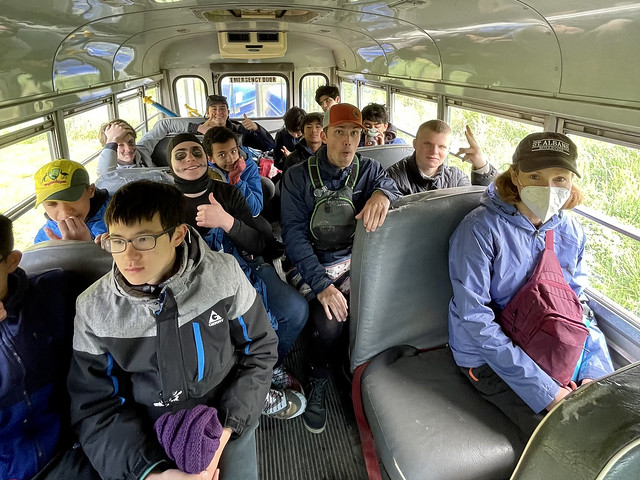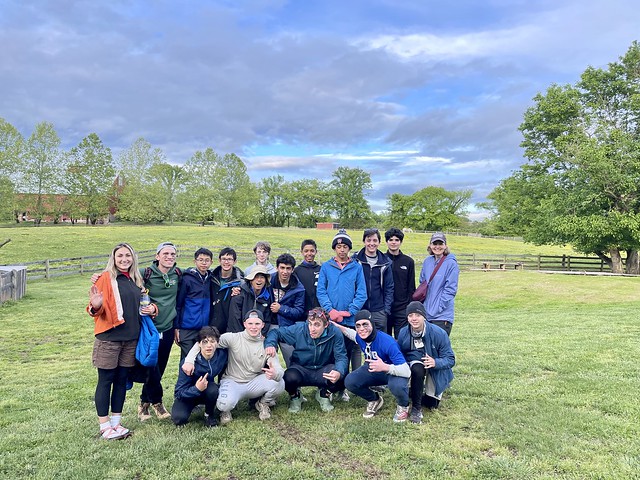Student Life
Chapel
Chapel Talks
Sharing and Not Running Out: Reflections from the Woodlands
At a recent chapel, Rev. Chadwick and Form II boys reflected on their experiences on what has become a rite of passage in the Lower School: the four-day camping and team-building exploration of the Woodlands of West Virginia. View more photos of their adventures, along with other groups’ adventures, on Flickr.
Rev. Chadwick: Describe your Woodlands experience in one word.
Leonard: Cold.
Declan: Wet.
Tatsuto: Rainy.
Brett: Fun.
Rev. Chadwick: How can it be that a cold, wet, and rainy [four] days spent camping in the mountains of West Virginia was also fun? While it would take too long to read all the stories from our group’s 10-page, single-spaced journal, we will give you an overview today.
Leonard: We also hope that today’s reflection will inspire you to ask others who went on this adventure about their untold stories.

Astin: From the beginning, our trip was marked by scarcity. We had no phones—only ourselves and each other for entertainment on the bus. We had no money with us.
Kane: In Moorefield, W.V., our last link to civilization, our guides gave us $7 and 5 minutes in a Walmart Supercenter to purchase an item for our group. Bypassing the hand warmers and $3 machetes, we chose a huge plastic jug containing more than a pound of baked cheddar cheese balls. The cheese balls would turn out to be “the best $7 ever spent.”
Brett: The guides even permitted an add-on purchase of some “eye black,” which would come in handy for boosting morale and creativity in the days to come.
Ashton: After setting up camp on the wet ground, we headed to the South Branch of the Potomac. Two people carried a canoe, each holding one end as an awkward, heavy dead-lift. We had to set them down every twenty paces or so, to adjust our grip and stretch our shoulders.

Astin: The river was as high as our guide had ever seen it and the current was swift. Many of our group were new to canoeing. Our first stop would be a rope swing past some rapids on the opposite shore. The first several boats made it across.
Brett: When those of us in the back arrived, the people on shore yelled for us to toss them the rope which was stuck out over the water. I jumped into the water to grab the rope, not realizing that Alex, in the back of our canoe, would continue floating downstream alone.
Alex: The water was moving fast. I was a little worried I wouldn’t get to shore. I was going backwards by myself in the canoe and was not strong enough to paddle upstream against the current. Then I realized that I had to let the river go and trust. Once you trust, it’s fine. Once you stop thinking you can fight it, it’s no longer stressful. You need help and trust that it will come.
Benjy: We sent our guides to find Alex while people jumped into the freezing water from the rope swing. We crossed the river to the take-out point and discovered that the battery to the bus was dead. As we stood around shivering, I saw Alex in the distance trying to lug one of those heavy canoes by himself through the tall grass about half a mile down the shore. I went to help him carry the boat, and Tatsuto followed, along with Evan and John.
Tatusto: We discovered that having 4 or 5 people carry one boat and going back to get another one was better than two people struggling, stopping, and starting [back up again].
Declan: I ran back to camp with Leonard and a guide to keep warm and to get the other bus. Did I regret jumping into the water off the rope swing? Yes.

Brett: It was so much colder than you expected.
Rev. Chadwick: One person later reflected, “What I like about camping is that I’m thankful for the little things like dry socks after wading in a cold river to lug in a canoe.” That comment contrasted with my complaining the day before at home about little things I’d considered inconveniences. Alex’s forgiveness of our team and accepting of our help was sheer grace. It put things in perspective.
Tastuto: Once we were back at camp, the propane wasn’t flowing properly. It took 45 minutes to defrost a huge chunk of meat with tomato sauce for 17 people. Hunger spurred creativity. Instead of complaining, someone put a playlist on our guide’s phone, and we danced to “Party in the USA.” Astin and I helped build a fire while John and Benjy helped cook. Brett roasted a carrot over the fire, cut it up and served it as an appetizer to the rest of us, saving none for himself. That inspired Leonard to take a flat piece of wood that looked like a cedar plank and cut up vegetables to roast on it.
Kane: After dinner, we reviewed our proudest and not-so-proud moments of the day while passing around the cheese balls. Good will flowed freely among teammates. One person who had no prior experience in a canoe said, “I was proud of our canoeing. At the beginning, we struggled, but we got better. We stayed dry!” I made up ghost stories to entertain the team two nights in a row, even incorporating a line from Macbeth for Dr. Lewis.

Rev. Chadwick: Two scripture stories came to mind for me as I watched the team entertain each other, help each other out, and learn to work together. In one story, a widow, a foreigner, shares her last meal with the prophet Elijah during a time of drought. She finds that the jar of oil and the handful of meal she had saved for her and her son, never runs out. Her sharing the little she had makes her open to experience the inexhaustible grace of God. The other is the familiar story of Jesus feeding the 5,000 with five loaves and two fish. The disciples want to send the people away, convinced that they don’t have enough to feed such a crowd, but Jesus insists, “You give them something to eat.” As they gather what they find and share it, they discover that there is more than enough to go around.
Ashton: The cheese balls became a symbol of such abundance. They never seemed to run out. When it rained and we were huddled under the food shelter, we ate the cheese balls and played cards. We ate them to warm up by a fire when we stopped for lunch on the river after fording a creek to scout two sets of rapids.
Benjy: We ate them back at camp as members of the chorus starting singing “Men of the Future, Stand” in harmony. We shared them as Declan made us laugh out loud describing how he and two teammates got locked inside John’s tent trying to lock John out for ending a two-hour game of Uno prematurely. We were fueled by them to play man hunt and stay up way too late.
Alex: The last morning, our group spontaneously burst into chapel songs and hymns around a morning campfire in 38-degree weather. The result? Joy and gratitude transforming a situation where complaints and negativity could have prevailed. Our theme song was “Ev’ry Time I Feel the Spirit” because of the lyrics “River Jordan, chilly and wide.”
As the bus pulled out of the campground for the last time, Kane said,
Kane: “Rev. Chadwick, I want to go, but I’m sad to leave.”
Rev. Chadwick: On our trip, lots of resources seemed scarce.
Ashton: Dead battery,
Alex: Slow flow of propane, and
Benjy: Lack of sunshine.

Rev. Chadwick: But the members of our team made the trip a joy with their resourcefulness, creativity, and cheerfulness. God’s grace flowed between us each time we helped someone with a tent or prepare food, shared the load of carrying canoes, or offered a joke or story to brighten the moment. I cannot summarize in one word the warmth I felt and still feel from the connections our team made with each other. I feel it now when someone pops his head into my office to make an inside joke or tells me before class about what happened after I left. When we step out to share what we have in community, we unlock the riches of God’s grace that never run out. They fill us with warmth and connection in a world that is chilly and wide. Amen.

St. Albans School
Phone: 202-537-6435
Located in Washington D.C., St. Albans School is a private, all boys day and boarding school. For more than a century, St. Albans has offered a distinctive educational experience for young men in grades 4 through 12. While our students reach exceptional academic goals and exhibit first-rate athletic and artistic achievements, as an Episcopal school we place equal emphasis upon moral and spiritual education.




